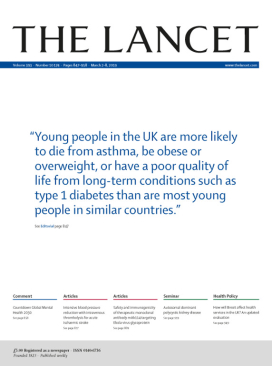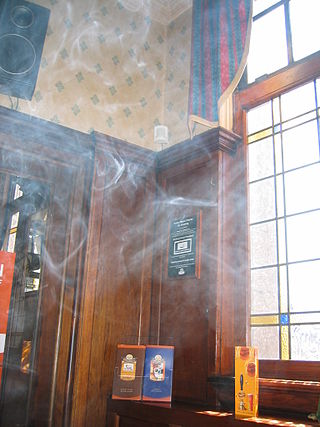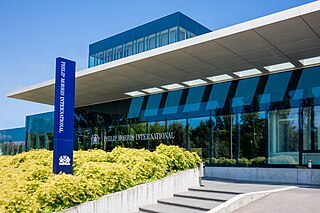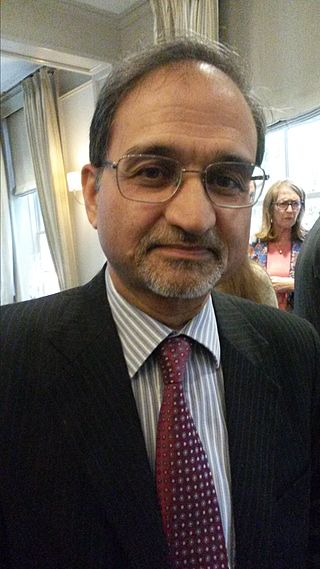
The tobacco industry comprises those persons and companies who are engaged in the growth, preparation for sale, shipment, advertisement, and distribution of tobacco and tobacco-related products. It is a global industry; tobacco can grow in any warm, moist environment, which means it can be farmed on all continents except Antarctica.

The Lancet is a weekly peer-reviewed general medical journal and one of the oldest of its kind. It is also the world's highest-impact academic journal. It was founded in England in 1823.

Snus is a tobacco product, originating from a variant of dry snuff in early 18th-century Sweden. It is placed between the upper lip and gum for extended periods, as a form of sublabial administration. Snus is not fermented. Although used similarly to American dipping tobacco, snus does not typically result in the need for spitting and, unlike naswar, snus is steam-pasteurized.

Passive smoking is the inhalation of tobacco smoke, called secondhand smoke (SHS), or environmental tobacco smoke (ETS), by persons other than the intended "active" smoker. It occurs when tobacco smoke enters an environment, causing its inhalation by people within that environment. Exposure to secondhand tobacco smoke causes disease, disability, and death. The health risks of secondhand smoke are a matter of scientific consensus. These risks have been a major motivation for smoke-free laws in workplaces and indoor public places, including restaurants, bars and night clubs, as well as some open public spaces.

Werner Arber is a Swiss microbiologist and geneticist. Along with American researchers Hamilton Smith and Daniel Nathans, Werner Arber shared the 1978 Nobel Prize in Physiology or Medicine for the discovery of restriction endonucleases. Their work would lead to the development of recombinant DNA technology.
Sir Richard Peto is an English statistician and epidemiologist who is Professor of Medical Statistics and Epidemiology at the University of Oxford, England.

Philip Morris International Inc. (PMI) is an American multinational tobacco company, with products sold in over 180 countries. The most recognized and best selling product of the company is Marlboro. Philip Morris International is often referred to as one of the companies comprising Big Tobacco.
The Global Burden of Disease Study (GBD) is a comprehensive regional and global research program of disease burden that assesses mortality and disability from major diseases, injuries, and risk factors. GBD is a collaboration of over 3600 researchers from 145 countries. Under principal investigator Christopher J.L. Murray, GBD is based out of the Institute for Health Metrics and Evaluation (IHME) at the University of Washington and funded by the Bill and Melinda Gates Foundation.

Anatoly Ivanovich Koryagin is a psychiatrist and Soviet dissident. He holds a Candidate of Science degree. Along with others, he exposed political abuse of psychiatry in the Soviet Union. He pointed out Russia constructed psychiatric prisons to punish dissidents.

Indoor and Built Environment is a peer-reviewed academic journal covering any topic pertaining to the quality of the indoor and built environment and how this affects the efficiency, performance, health, and comfort of those living or working there. Topics range from urban infrastructure, design of buildings, and materials used for laboratory studies including building airflow simulations and health effects. The editor-in-chief is Chuck Yu. It was established in 1992 by consultants to the tobacco company Philip Morris, and is published by SAGE Publications.
The Center for Indoor Air Research was a tobacco industry front group established by three American tobacco companies—Philip Morris, R.J. Reynolds, and Lorillard—in Linthicum, Maryland, in 1988. The organization funded research on indoor air pollution, some of which pertained to passive smoking and some of which did not. It also funded research pertaining to causes of lung cancer other than passive smoking, such as diet. The organization disbanded in 1998 as a result of the Tobacco Master Settlement Agreement.

Shekhar Saxena, MD, FRCPsych, DAB, MRC, Psych, since 1998 has worked at the World Health Organization (WHO) and since 2010 has been the Director of the Department of Mental Health and Substance Abuse (MSD) at World Health Organization's Headquarters Office in Geneva, Switzerland. He is recipient of the 2017 Leon Eisenberg Award. In September 2018 joined the Harvard T.H. Chan School of Public Health as visiting professor of Global Mental Health in the Department of Global Health and Population.

Oriol Mitjà i Villar is a Catalan-born Spanish researcher and consultant physician in internal medicine and infectious diseases with expertise in poverty-related tropical diseases. He has conducted research at the Lihir Medical Centre in Papua New Guinea since 2010 on new diagnostic and therapeutic tools to eradicate yaws. He was awarded the Princess of Girona Award in the scientific research category. Currently at the Germans Trias i Pujol Research Institute, Mitjà is conducting research on SARS-CoV-2 coronavirus disease (COVID-19) and strategies to control the infection at a community level.
Horace Joules LRCP, MRCP, MRCS, FRCP was a British physician, health administrator and health campaigner, who played an important role in promoting public health and preventative medicine; particularly the link between cigarette smoking and lung cancer following the work of Richard Doll, Austin Bradford Hill, Ernst Wynder and Evarts Graham, and the adverse effects of air pollution.
The Foundation for a Smoke-Free World is an organization founded in 2017. It is funded by Philip Morris International, which had initial plans for $80 million in annual funding, with the aim of smoking harm reduction. The current pledge agreement from PMI to the Foundation, modified in September 2020, promises $35 million in funding to the Foundation from 2022 through 2029.
Health Action International (HAI) is a non-profit organization based in The Netherlands. Established in 1981, HAI works to expand access to essential medicines through research, policy analysis and intervention projects. The organization focuses on snakebite envenoming, access to insulin and developing European policies on medicines. HAI is listed by the World Health Organization (WHO) as an official non-state actor.
Ragnar Rylander was a Swedish environmental health scholar who served as professor and chair of Environmental Medicine at the University of Gothenburg. He was active in researching the health effects of tobacco while secretly serving as a consultant to Philip Morris for many years.
Peter Salama was an Australian epidemiologist who worked for UNICEF (2002–16) and the World Health Organization (2016–19). He was particularly known for his work at both organisations managing their responses to Ebola epidemics in Africa. Richard Horton, editor of The Lancet, described him as "a loyal and committed health advocate and multilateralist" who "brought depth and strength to WHO".

The Vaccine Confidence Project (VCP) founded in 2010 by Heidi Larson, was developed in response to hesitancy and misinformation on vaccination programmes such as those that caused a boycott of polio eradication efforts in Northern Nigeria in 2003–04. It is an early warning system to identify and evaluate public confidence in vaccines, with the purpose of tackling the problem early, when it is likely to be manageable.











